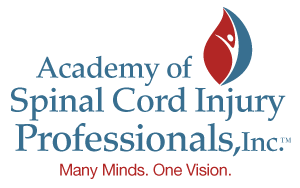Sample letter to obtaining transanal irrigation coverage

Dora Hughes M.D.
Chief Medical Officer & Director
Center for Clinical Standards & Quality Centers for Medicare and Medicaid Services Department of Health and Human Services
7500 Security Blvd.
Baltimore, MD 21244
RE: Support for Medicare coverage of medically prescribed transanal irrigation for management of neurogenic bowel secondary to spinal cord injury
Dear Dr. Hughes,
I am writing to you on behalf of the Academy of Spinal Cord Injury Professionals (ASCIP) in my role as President. ASCIP is a not-for-profit incorporated association whose mission is to optimize the health and wellness of individuals with spinal cord injury or disability (SCI/D) through advanced interdisciplinary education, professional development and scientific research. The purpose of this letter is to advocate for the Medicare coverage of transanal irrigation (TAI) which is utilized by people with SCI/D to assist in helping them have bowel movements.
Approximately 305,000 people in the United States are living with the effects of a traumatic spinal cord injury (SCI/D) with roughly 18,000 new injuries occurring each year. Less than one percent of people with SCI/D recover fully with no residual issues.1 According to a study by Anderson et.al., the second most important issue in SCI/D rehabilitation is to have a regular and predictable bowel program, rated as even more important than walking.2 Most individuals with SCI/D have chronic gastrointestinal (GI) symptoms. The term "neurogenic bowel dysfunction" (NBD) is commonly used to describe bowel dysfunction resulting from trauma or disease within the spinal cord.
NBD occurs in more than 80% of individuals with SCI/D and may become more severe with time since the injury. The most commonly reported symptoms include constipation (reported by 32% to 56%) and fecal incontinence (27% to 86%).3 Both of these are symptoms of NBD and are major indicators of life satisfaction. The burden of NBD is so great that people with SCI/D report it as more problematic than any bladder or sexual dysfunction, pain, fatigue, or perception of body image.4
Bowel dysfunction can be stressful and/or the source of significant depression or anxiety. It has been identified as interfering with social activities, personal relationships, and work, thus affecting an individual's mental state and quality of life (QOL). Those with fecal incontinence fear going out in public in anticipation of having a bowel accident. They very often become agoraphobic (fear of public places) and lead isolated lives with less participation in social activities they enjoy than their peers without SCI. Fecal incontinence has also been shown to be a barrier to employment after SCI. For 94% of those with SCI/D, management of NBD requires the establishment of a daily or every other day bowel program and the use of oral medication, digital rectal stimulation (to promote peristalsis), rectal suppository, and/or manual evacuation. One third of people with SCI/D also require a caregiver to perform the program. For 22% of individuals with SCI, bowel management takes up to an hour on every occasion, and for 14% it takes over 60 minutes.5
Current treatment options for NBD fit into a continuum from least to most invasive, including oral medications, digital rectal stimulation, suppositories, enemas, cone/balloon large volume enema, transanal irrigation system, antegrade enemas: Malone antegrade colonic enema (MACE), cecostomy, other, pouched fecal diversion (colostomy, ileostomy).6 As noted, TAI is part of this continuum and outperformed or matched less invasive treatment options in all parameters in a comparative randomized control trial. Further, it is recommended by several clinical guidelines as the preferred treatment after less invasive options and before more invasive surgical options are considered. Evidence supports the success of TAI in treating constipation (40% to 63% of cases), fecal incontinence (47% to 72.7% of cases), and prolonged defecation time. TAI also increased satisfaction in symptom related QOL.3
In addition, a cost analysis of TAI against those less invasive options estimated significant lifetime financial savings. Despite the higher product cost of TAI, the overall cost was offset by lower caregiver costs, bowel care time, and frequency of urinary tract infections (which is one of the leading causes of hospitalization for people with SCI/D).7
In summary, the lives of people living with SCI/Dare greatly affected by NBD. Establishing a regular bowel program that promotes more complete emptying of stool and minimizes or eliminates incontinence and constipation is vital.
Without reservation, ASCIP strongly advocates the full Medicare coverage of transanal irrigation systems to improve the quality of life of those with neurogenic bowel disease.
Sincerely,
Joe Fangman, PT
Physical Therapy Supervisor for SCI @ Craig Hospital
President of Academy of Spinal Cord Injury P1ofessional (ASCIP) jfangman@craighospital.org
Tel: 303.189.8324
1 National Spinal Cord Injury Statistical Center, Traumatic Spinal Cord Injury Facts and Figures at a Glance. Birmingham, AL: University of Alabama at Birmingham, 2024.
2 Anderson KO. Targeting recovery: priorities of the spinal cord-injured population. J Neurotrauma. 2004 Oct;21(10):1371-83. doi: 10.1089/neu.2004.21.1371. PMID: 15672628.
3 Johns J., Krogh K., Rodriguez G., Eng J., Haller E., Heinen M., Laredo R., Longo W., Montero-Colon W., Karsten M. Management of Neurogenic Bowel Dysfunction in Adults after Spinal Cord Injury: Clinical Practice Guideline for Healthcare Providers. Journal of Spinal Cord Med. 2021. Doi:10.1080/10790268.2021.188338.
4 Glickman S, Kamm MA: Bowel dysfunction in spinal-cord-injury patients. Lancet. 1996;347(9016):1651-3. 10.1016/s0140-6736(96)91487-7
5 Krogh K, Nielsen J, Djurhuus JC, et al.: Colorectal function in patients with spinal cord lesions. Dis Colon Rectum. 1997;40(10):1233-9. 10.1007/bf02055170
6 Emmanuel AV, Krogh K, Bazzocchi G, Leroi AM, Bremers A, Leder D, et al. Consensus review of best practice of transanal irrigation in adults. Spinal Cord. 2013;51:732-738. doi: 10.1038lsc.2013.86.
7 Emmanuel A, Kumar G, Christensen P, et al.: Long-Term Cost-Effectiveness of Transanal Irrigation in Patients with Neurogenic Bowel Dysfunction. PLoS One. 2016;11(8):e0159394. 10.1371/journal.pone.0159394

